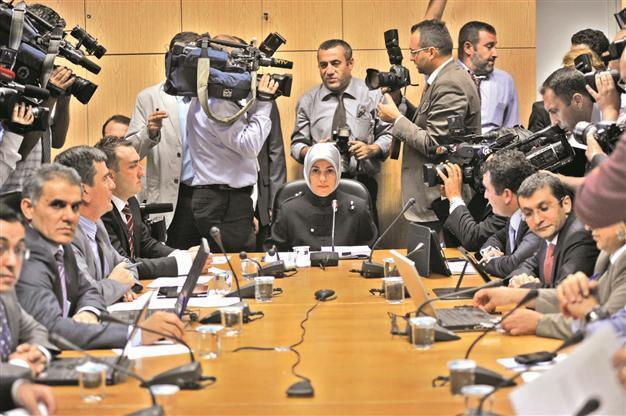Ex-lawmaker Kavakçı speaks of ‘unnamed coup’
ANKARA

Merve Kavakçı (C) speaks in front of a parliamentary panel on military coups. DAILY NEWS photo, Selahattin SÖNMEZ
Merve Kavakçı, Turkey’s first and only headscarved deputy, spoke in Parliament for the first time in thirteen years on Oct. 19 about her bitter experiences in the late 1990s, while addressing members of Parliament’s Coups and Military Memorandums Commission.
“I hope that the result of the Commission’s work will make a contribution to resolving ‘the Kavakçı Case.’ In this context, I demand that Parliament make a decision to restore my rights, which were seized at the time by Parliament,” Kavakçı said.
On May 2, 1999, after being elected deputy the previous month, Kavakçı entered Parliament wearing a headscarf. Pandemonium broke out as other deputies beat on desktops and called for her to get out, with late Prime Minister Bülent Ecevit denouncing her in strong terms and calling a recess. Kavakçı said that on that day she was prevented from fulfilling her duty as a lawmaker. “Also, the right to representation of the people who elected me was seized. What was experienced at the general
assembly was an unnamed coup.”
Kavakçı was elected as Istanbul deputy for the Virtue Party (FP) in 1999. She was prevented from taking the parliamentary oath on the grounds that she was wearing a headscarf, and her citizenship was consequently annulled over arguments that she was a citizen of the United States.
The incident triggered the Constitutional Court to dissolve the FP in June 2001, on the grounds that it had become a “center of activities contrary to the principle of secularism.”
Kavakçı said that she regarded her case an extension of the Feb. 28 process, the harsh Army-led campaign that forced Turkey’s first Islamist prime minister, the late Necmettin Erbakan, to resign in June 1997.
“As headscarved women, our Feb. 28 is still going on. It isn’t only the ‘Feb. 28 media,’ but also -
whether you call it Islamist or conservative - this media has left me alone too,” she said.
